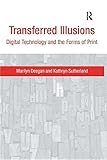Transferred Illusions Digital Technology and the Forms of Print
Language: English Publication details: Oxford Routledge 20160224Edition: 1Description: 218 pISBN:- 9781317007890
This is a study of the forms and institutions of print - newspapers, books, scholarly editions, publishing, libraries - as they relate to and are changed by emergent digital forms and institutions. In the early 1990s hypertext was briefly hailed as a liberating writing tool for non-linear creation. Fast forward no more than a decade, and we are reading old books from screens. It is, however, the newspaper, for around two hundred years print's most powerful mass vehicle, whose economy persuasively shapes its electronic remediation through huge digitization initiatives, dominated by a handful of centralizing service providers, funded and wrapped round by online advertising. The error is to assume a culture of total replacement. The Internet is just another information space, sharing characteristics that have always defined such spaces - wonderfully effective and unstable, loaded with valuable resources and misinformation; that is, both good and bad. This is why it is important that writers, critics, publishers and librarians - in modern parlance, the knowledge providers - be critically engaged in shaping and regulating cyberspace, and not merely the passive instruments or unreflecting users of the digital tools in our hands.
There are no comments on this title.
